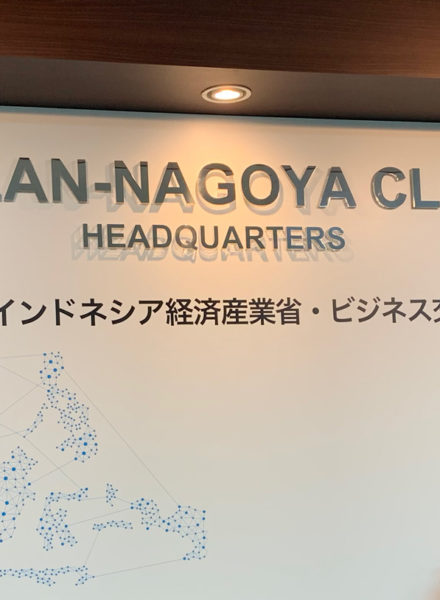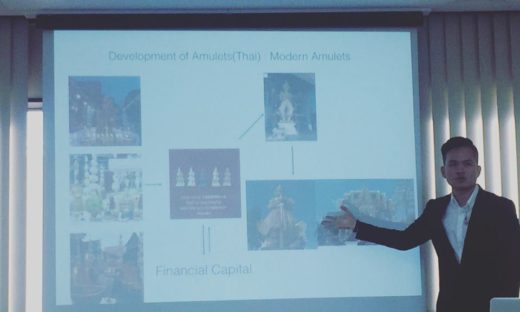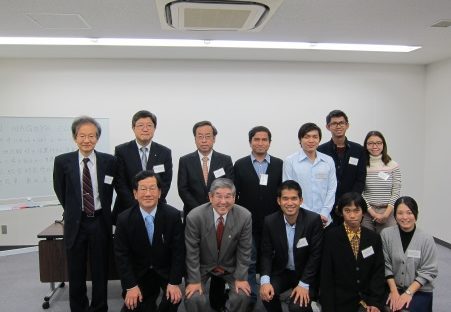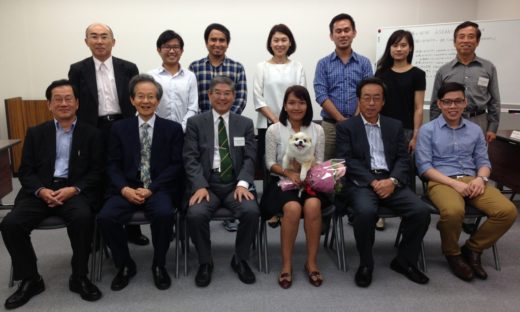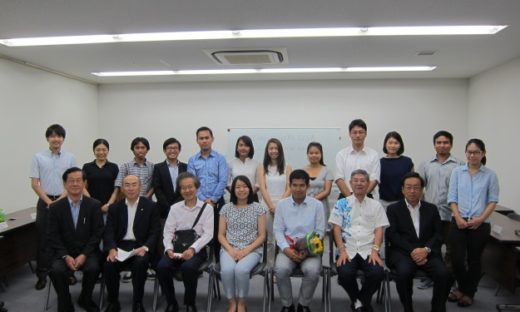第5回ミーティング報告書 2014年12月16日 The 5th Meeting Report (December 16, 2014)
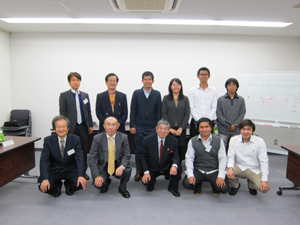
第五回目のミーティングを行いました。これまで、留学生の皆さんの母国の紹介と日本側からの質疑を中心に議論を進めてきましたが、第五回目はASEAN-NAGOYA CLUBの本来の主旨である文化の相互理解について議論を深めることにしました。
銘打って「Cross Culture Meeting」です。
本日のテーマは「日本人はなぜYES、NOを言わないのか」。
昔から海外文化摩擦の象徴です。留学生の皆さんも日頃、この日本人の曖昧な態度に困惑し、ときに疑心暗鬼になるといいます。
アメリカの文化人類学者エドワード・ホールによれば、世界の文化はハイ・コンテキストとロー・コンテキストに分類され、日本語は世界の中でも最もハイ・コンテキストの部類に属するとのことです。ハイ・コンテキストとは、その国の固有の文化、価値観、思考方法、伝統などがベースとなった文化です。日本語が世界の中でも最もハイ・コンテキストに属するということは、日本人の共通の文化、価値観などを理解していないと日本語の理解はとても難しいことになります。留学生のコラムにあるように、「日本人は同意もしていないのに、”はい”といいます。私は全く理解できません」という現象です。確かに、論理的には矛盾しています。
このように、留学生が経験する”不思議な体験”の一つである「YES、NOを言わない」現象についてみんなでその文化的背景を探ることにしました。
【困惑したいくつかのケース】
・留学生が博士課程の研究課題について、指導教官にテーマ選択の是非の見解を求めたところ、「それは難しい」と言われました。「難しい」というのはNoなのか、Yesなのか分からずに途方に暮れました。Noと言われれば、方針を変えればよいのですが、「難しい」という表現では、どうすればよいのかわかりません。(留学生の体験)
この例に限らず、海外の人を相手に日本人がYES、NOを言わずにコミュニケーションをするケースは枚挙に暇がありません。そこで、どうしてそのようなことが起こるのか、日本人の参加者が日本文化の背景について説明を行いました。以下、私たち日本人が共通にもっているイメージです。
【日本人の解釈】
1.Noと言えば、その人の可能性がなくなってしまう。その可能性をなくすことは残念である。一方、Yesと言えば、自分が責任を抱え込んでしまう。Yes,Noはともにリスクがあり、自分と相手との関係を大事にしたいという思いが「それは難しい」という表現になって出てくる。
2.Noと言わないのは以心伝心の文化である。Noといえば相手のプライドを傷つけることになる。それを言わないことが日本のこころである。つまり、Noと言わないこころを察することが重要であるとの思考方法である。以心伝心は、最もハイ・コンテキストの言葉といる。
3.上司と部下の関係で言えば、上司がNoというとき、その理由を言わないことがある。つまり、「よく考えなさい」。「1を聞いて10を知ること」であると。理由を言わないことで、相手に思考と心を磨かせる。これも非常に難しい文脈である。
4.四方を海に囲まれてきた小さな世界で生きてきた日本人には和の文化が強い。小さな世界で生きているため、できることなら対立を避けたい。人を傷つけることを避けたいという思考方法がある。
5.Yes、Noに分けられないグレーゾーンがある。このグレーゾーンについては、日本人はYes、Noを言わない。
6.ビジネスでは、権限の問題が深く関係している。もし社長が海外の人と折衝をするときには、その場でYes、Noと答えることができるが、権限を持たない立場であれば、曖昧にならざるを得ない。
曖昧な日本人の姿について、歴史学者であった故会田雄次さんが次のような文章を残しておられます。
「察しと思いやり。これこそ日本人の心を色濃く染めている特徴である。・・・自己主張をむしろマイナスとする。ごく小さな共同体でも、自己主張は共同体の和を乱しかねない危険なものである。人間個々は身のほどをわきまえ、つつしみ深く控えめにしていてこそ、穏やかに平和に生きていくことができる。・・・微妙な心の動きが、察しと思いやりである。相手のことを察し、思いやる。これこそが日本人の無比なる知恵といってよい。欧米の個と日本の個は、あり方のベクトルがまったく反対なのだ。欧米は自己主張し、外に向かって行くことによって個が保たれ、保障される。だが日本では、個は外に向かっては行かない。その必要がないのである。お互いに察し、思いやることによって、個は保たれ、尊重されるのだ。このこまやかさによって、日本人は集団と個のバランスをとっているのである。個と全体のバランスは、攻撃的個人主義の欧米では相互に主張し、衝突し、妥協に到達するということで保たれる。日本では言葉に出せば、必ず要求は過剰になる。それのみか、その主張には偽り、不正な自己正当化を必然的に内在させる。そういう言葉、言挙げ、いいつのりではなく、より自己の心を拡大する訓練を行うことで解決する。察し、思いやり、慎み、控えめといった心情を養うことがそれであるとする。ここに日本人の品性、優美さ、精密さ、繊細さといったものが生まれる」。
出典 「日本人として言い残しておきたいこと」会田雄次 大和出版
では、今回のテーマ「日本人はなぜYES、NOを言わないのか」について、まとめておきたいと思います。
【YES、NOを言わない理由】
1. 日本人は常に相手の立場に立ってものごとを考える。
2. ものごとにはグレーゾーンが多いと考える。
3. 相手を嫌な気分にさせない努力をする。
4. 対立を避けようとする。
5. 相手に熟慮する機会を与える。
6. 苦しいことを分かち合うことで相手の苦しさを軽減する。
7. 常に人間は不完全であると考えている。“すみません”という言葉に表れる。
8. ビジネスにおいて、権限を持たないとき。
【日本人自身が困ること】
1. 相手の立場に立った意見を述べようとするため、考えを整理するのに時間がかかる。
2. 時間がかかるため、曖昧な返事をすることがある。
3. 相手の立場に立つあまり、会議が曖昧になる。
4. 言いたいことを言えずに、ストレスがかかる。
5. 相手が婉曲表現を理解しないときは、コミュニケーションがとれない。
【海外と交流するとき、日本人自身が変えたほうがよいところ】
1. Yes, Noをはっきりいう。
2. 結論を先にいう。
3. 曖昧な返事をするときは、その理由を述べる。
【日本文化の評価すべきところ】
1. 常に相手の立場に立つことで、対立が少なくなる。
2. 相手の立場に立つ思考は、より多くのアイデアをもたらす。
3. 改善する力がつく。
4. 思考が深くなる。
5. 熟慮するため人間に品格が備わることが多い。
6. 信頼を基礎にものごとを考える。
Cross Culture Meeting
We held the 5th meeting in December. The discussions focused on the mutual understanding of culture, which is the original purpose of ASEAN-NAGOYA CLUB. The theme was ” Why Japanese people don’t say YES or NO “. International students are usually confused by this vague attitude of Japanese people and sometimes become suspicious.
There is a trend among Japanese people that many people on this discussion have enlightened, with multiple topics. Japanese people are used to never say “no” or at least, always appear to agree. Then they do the contrary. Moreover, there is also some kind of trends to prefer to stop contacting and disappear instead of replying frankly. We don’t judge this behavior is good or not. Each behavior has advantages and shortcomings. A country where people use to say “no” frankly can also be considered at an unpolite country.
According to American cultural anthropologist Edward Hall, world culture is divided into high context and low context, and Japanese belongs to the highest context category in the world. High context is a culture based on the country’s unique culture, values, ways of thinking and traditions. The fact that Japanese belongs to the highest context in the world makes it very difficult to understand Japanese unless you understand the common culture and values of the Japanese. As you can see that “Japanese people do not agree, but they say ” yes “. It is so difficult to predict and understand what actually they are thinking. Indeed, it is logically inconsistent.
In this way, we have explored the cultural background of the phenomenon of “Do not say YES or NO” which is one of the “mysterious experiences” that International students have experienced.
For example, when an International student asked his / her supervisor for his / her opinion on the topic of writing / dissertation for the doctoral program, he / she was told that it was difficult (それは難しい – sore wa muzukashi). It was so confusing, what was the meaning of difficult, he said that without any further explanation. If he said “no” and told us that the topic wasn’t good enough, we could directly correct it. If he just said it was “difficult” without telling us what to do, it was so confusing. (Experience of international students).
There are many other cases in which Japanese people communicate with foreigners without saying YES or NO. Japanese participants tried to explain the background of Japanese culture why such a thing happens. The following are some of their reasons:
1. The people don’t want to lose face, especially respect for seniors. No at the beginning of a conversation does not give room to change one’s mind midway, if needed, especially looking at the reaction of one’s opponent’s face. Japanese language is constructed such that the verb comes last so you can change the sentence to positive or negative the very last minute.
2. Not saying No is the culture of Ishin-denshin (以心伝心). Speaking of No, it will hurt others. In Japanese culture, it is not polite to say “NO” directly. the word “NO” always carries negative emotion in Japanese language. showing anger, sadness, or something like that. We may use other words and phrases to express our NO intension indirectly in conversation. In other words, it is important to understand the typical Japanese mind who does not say No.
3. Speaking of the relationship between a boss and his subordinates, when the boss says No, he may not say the reason. In other words, “think carefully.” “Listen to 1 and know 10”. By not giving a reason, let the other person hone their thoughts and hearts. This is also a very difficult context.
4. Japanese culture is strong for Japanese people who have lived in a small world surrounded by the sea. I live in a small world, so they want to avoid conflict if possible. There is a way of thinking that you want to avoid hurting people.
5. There is a gray zone that cannot be divided into Yes and No. Japanese people do not say Yes or No about this gray zone.
6. In business, the issue of authority is deeply involved. If the president negotiates with an overseas person, he can answer Yes or No on the spot, but if he is in a position without authority, it must be ambiguous.
A historian named Yuji Aida writes the following about the ambiguous appearance of the Japanese. Self-assertion by speaking firmly about your opinions and demanding the rights that you believe you should have can disrupt community harmony. The community harmony will be coming true if all human beings live in calm and peaceful way. The subtle gesture and politeness are very important that Japanese people do not tolerate any kind of disrespect. Thus, they show their respect for others as much as they could.
Western individuals and Japanese have completely opposite customs. There are some cultural contrasts as well as commonality. They may be better to express themselves directly so that the other party will understand you fully well and they are also very individualized. However, Japanese attempts to avoid disagreement and the respect for one another should always be practiced in the community. Basically, the principle in their culture is to avoid any kind of conflict or disagreement at all costs. This is practiced strictly by everyone in Japan as they do not want to offend anyone.
There is an old saying in Japanese which translates as “The nail that protrudes will be hammered down,” and it says much about the place of the individual in Japan’s group-oriented society. All cultures must balance the often-conflicting needs of the individual to be happy, and of the society to function. But in Japan, historically and even up to the modern age, that balance more often favors society over the individual.
The feelings of each individual are well cared for and respected. With this, the Japanese hope there is a balance between group and individual interests. Balance between individuals by avoiding disputes, disagreement, clashes, so as to reach a compromise in Western countries from aggressive individualism. It is to arise feelings of understanding, compassion, and still maintain politeness. Source: What I want to leave as Japanese “Yuji Aida Daiwa Shuppan.
The Conclusion [Reason for not saying YES or NO]:
1. Japanese people always concerns about the standpoint of the other party.
2. There are many gray areas and uncertainty.
3. Making an effort not by making the other person feel unpleasant.
4. Trying to avoid conflict.
5. Giving the other people an opportunity to consider.
6. Reducing the suffering of the other party by sharing the pain.
7. We always think that humans are imperfect. It appears in the word “I’m sorry”.
8. In business, it’s all about compromise not authority.
2. It may cause an ambiguous response in a meeting/ workplace.
3. Some individuals get stressed without saying what they want to say.
4. When the other person does not understand the euphemism, he / she cannot communicate. [What the Japanese should change when interacting with foreign countries] 1. Clearly saying Yes and No.
2. Giving the conclusion first.
3. If you give an ambiguous response, state the reason. [Points to be evaluated in Japanese culture] 1. By always standing in the position of the other party to avoid conflicts.
2. Thinking from the other person’s point of view brings more ideas.
3. Gaining the power to improve.
4. Deepen your thinking.
5. Humans often have dignity for careful consideration.
6. Considering about such problems based on trust.
参加者:
<日本人メンバー>
西氏、鈴木氏、大黒氏、倉科氏、松久氏(コーディネーター)、田中氏(スタッフ)
<留学生メンバー>
Mr.Pak Chanlino、Mr.Ngov Houtchhay、Mr.Var Vichea、Mr.Lim Lyhong、Mr.Indra Kesuma Nasution、Mr.Mardiansyah Mardis、荻巣先生(名古屋大学コメンテーター)
レクチャー終了後、居酒屋に場所を移し、年内最後の話し合いを行いました。会を重ねるたびに深い話し合いが行われうようになっています。相互交流には率直な疑問をぶつけ合うことがなにより大切です。印象に残ったのは、「なぜ、これほど親切な人ばかりの日本人なのに、戦争を起こしてしまったのですか」という質問でした。それには大きな理由がありました。
After the lecture, we moved to a tavern and had the last discussion of the year. Deep discussions are held at each meeting. It is of utmost importance to ask frank questions for mutual exchange. What impressed me was the question, “Why did you start a war even though all the Japanese are so kind?” There was a big reason for that.






